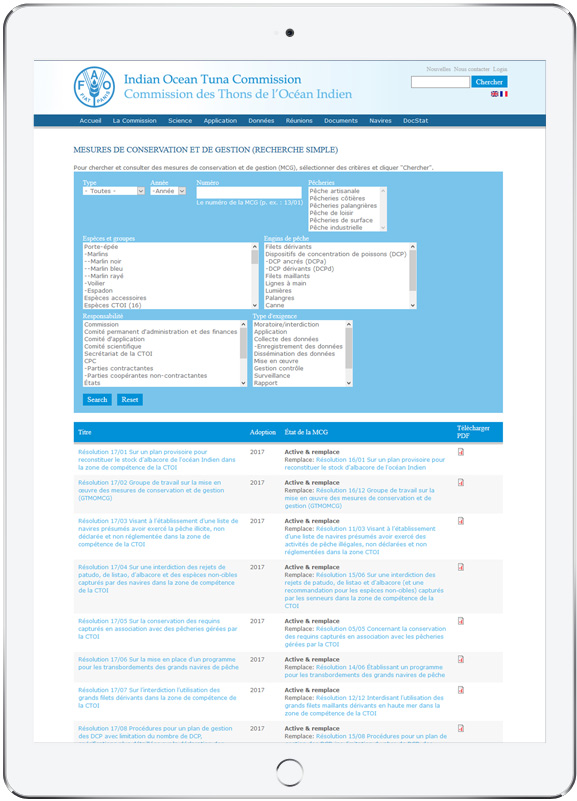Important disclaimer: this project was carried out by the founder of Naes as an independent consultant and is listed here as a reference project for the Drupal platform.
The Client : IOTC
The Indian Ocean Tuna Commission established in 1993 is an intergovernmental organization composed of 34 member countries (CPCs) which are : Australia, Bangladesh, China, Comoros, Republic of Korea, Eritrea, France, Guinea, India, Indonesia, Islamic Republic of Iran, Japan, Kenya, Liberia, Madagascar, Malaysia, Maldives, Mauritius, Mozambique, Sultanate of Oman, Pakistan, Philipines, Senegal, Seychelles, Sierra Leone, Soalie, South Africa, Sri Lanka, Sudan, Tanzania, Thailand, United Kingdom, European Union, Yemen.
It fulfils the functions and responsibilities set out in the United Nations Convention on the Law of the Sea, namely :
- monitoring the state and evolution of fish stocks and ensuring their conservation;
- collect, analyse and disseminate scientific information, catch and effort statistics;
- coordinating research and development activities;
- monitoring the economic and social aspects of fisheries;;
In order to encourage Commission members to take action, Conservation and Management Measures (CMMs) are promulgated as resolutions (binding) or recommendations (non-binding and transitional).
The main goal: moving from a model based on measurements compiled in a PDF to an application for managing and searching for all resolutions and recommendations.
Currently all of these measures are made available in a single PDF file that can be downloaded or sent by email.
What problems does that pose?
There are several problems related to the exploitation of a PDF file:
- Users are not notified when a new version is available, requiring them to make sure to search, compare and then download the new version to date;
- It does not allow easy consultation of these measures or to carry out a precise search for a resolution or recommendation, to know which one to apply on the date, etc. ;
- There is no possibility of statistical monitoring (what searches have been made, which user profile has been accessed, how often visits have been made, etc.) ;
- There is no formalized model making it sometimes difficult to enter or read.
- It is difficult to know which resolution or recommendation is the one active at the time.
Facilitating access to this information by the Members of the Commission will make it possible to ensure their full application and thus a more sustainable use of resources, better conservation of biodiversity and economic sustainability of the entire chain concerned.
The solution: a PHP/Drupal-based web application with search tools and a back-office to manage all past, present and future Measures.
The solution proposed to the IOTC will enable it to :
- Have an application with a back-office capable of allowing them to add, archive, modify or upgrade these GCMs;
- Obtain indexing and online operation via a powerful search engine using free text input and pre-configured filters,
- Monitor the activity of users in all the countries concerned consulting these documents.
- Access to and knowledge of these online resolutions is indeed essential to improve levels of compliance with the measures.
The design of this application required intervention at several levels of conception and understanding both of the business and the issues at stake and of the various processes involved in creating, drafting, making available and habitually sharing this type of information internationally. These included :
- Collaborating with scientists, researchers or high-ranking officials from all the countries concerned;
- Understanding, standardizing their structure and implementing past and present GCMs;
- Providing a complete Drupal back office with tools for searching, creating, modifying or deleting GCMs; managing the filters presented to the user; and analytically monitoring the searches performed and the users of the application;
- Structuring the application in English and French;
- Set up a search engine in standard and advanced mode with a full-text and filter search module;
- Set up a data export engine (CSV);
- Write all technical and user documentation;
- Deliver training to IOTC staff (editors and administrators);
- Configure, install and put into production the entire application on a dedicated server in collaboration with a local Seychelles agency.
Some figures on this sector
- Nearly 70,000 visits per year from the scientific community and international maritime bodies are expected for this online application;
- 34 countries are concerned by the Conservation and Management Measures (MCGs): Australia, Bangladesh, China, Comoros, Eritrea, European Union, France (Tom), India, Indonesia, Islamic Republic of Iran, Japan, Kenya, Republic of Korea, Madagascar, Malaysia, Maldives, Mauritius, Mozambique, Oman, Pakistan, Philippines, Seychelles, Sierra Leone, Somalia, South Africa, Sri Lanka, Sudan, United Republic of Tanzania, Thailand, United Kingdom (Tom), Yemen, Liberia, Senegal.
- The implementation of these resolutions and recommendations will make it possible to help manage, monitor and analyse the 11 million tonnes of fish caught each year in the Indian Ocean by more than 380,000 artisanal and industrial fishing vessels.
In conclusion
This new application implemented within an existing site has obviously had immediate benefits for the IOTC :
- An information base that can be easily consulted via a standard web browser without any third party plugin;
- Simplified and daily updates via a complete back-office;
- An analytical follow-up of the visits of the different categories of users;
- The possibility of making targeted searches in free text with filters in simple or advanced mode;
- Fully indexed and standardized documents in a database;
- The power of a solution under Drupal, an open-source, secure and flexible framework (multiple possible evolutions);
